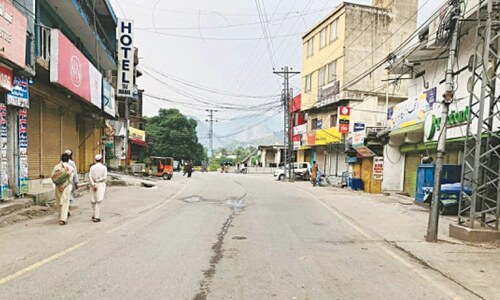ISLAMABAD, Oct 1: Dam engineers of the National Engineering Services Pakistan (Nespak) and legal experts in the Ministry of Law are unanimous that Pakistan has made history when the International Court of Arbitration (ICA) restrained India from further work on its dam on the Kishanganga/Neelum River and diverting flow of water.
“Having reviewed Pakistan’s arguments as they are stated in its Memorial, the court cannot exclude the possibility that India’s planned installations, or elements of those installations, on the Kishenganga/Neelum River would not be in conformity with the Indus Water Treaty (IWT),” said the Court of Arbitration in its decision.
Last week, the International Court of Arbitration (ICA) issued the stay order after Pakistan challenged the diversion of the river in violation of the IWT.
The court made it clear that all other works that India had already completed or were under construction, would be governed by the “proceed at own risk” principle. India was free to dig tunnels and proceed with the powerhouse. However, if the court in its final decision orders India to dismantle, discontinue or modify the plan, India will have to do so at its own expense losing the massive costs it likely to incur for nothing.
Legal experts with the Ministry of Law were wondering if it were economically feasible for India to continue under these circumstances.
“India had better spend $400 million on improving living standards of its citizens starting with slums in Calcutta or educating under privileged children,” said a legal expert with the Ministry of Law on condition of anonymity.
According to a Nespak dam engineer, India can continue digging tunnels and construct sub-surface foundations of the dam, even dry up the river bed as none of the above would affect the flow of the river to its natural channel.
“Operation of the project will be impossible without the permanent dam if the court declares that the planned diversion of the river, which is a major component of the Kishanganga project, as illegal and a treaty violation,” the dam engineer said.
The dam engineer explained that the river was to be diverted through the head race tunnel under pressure to supply water to the powerhouse for the generation of 330MW electricty.
But, if the court determines that the treaty does not permit the permanent diversion of the Kishanganga/Neelum River, India will undoubtedly have to change the design of the plant. It may also be determined by the court that India could not deplete or bring the reservoir level of a run-of-river plant below dead storage level in any circumstances except in the case of an unforeseen emergency.
“The powerhouse would have to be dismantled, tunnels, excavations and subsurface foundations so completed would no longer be required and costs would have to be incurred afresh under the new design,” he said implying it would be better for India to stop work altogether now as the court would most certainly have considered whether Pakistan had so far presented sufficient evidence to support its claim.














































Dear visitor, the comments section is undergoing an overhaul and will return soon.